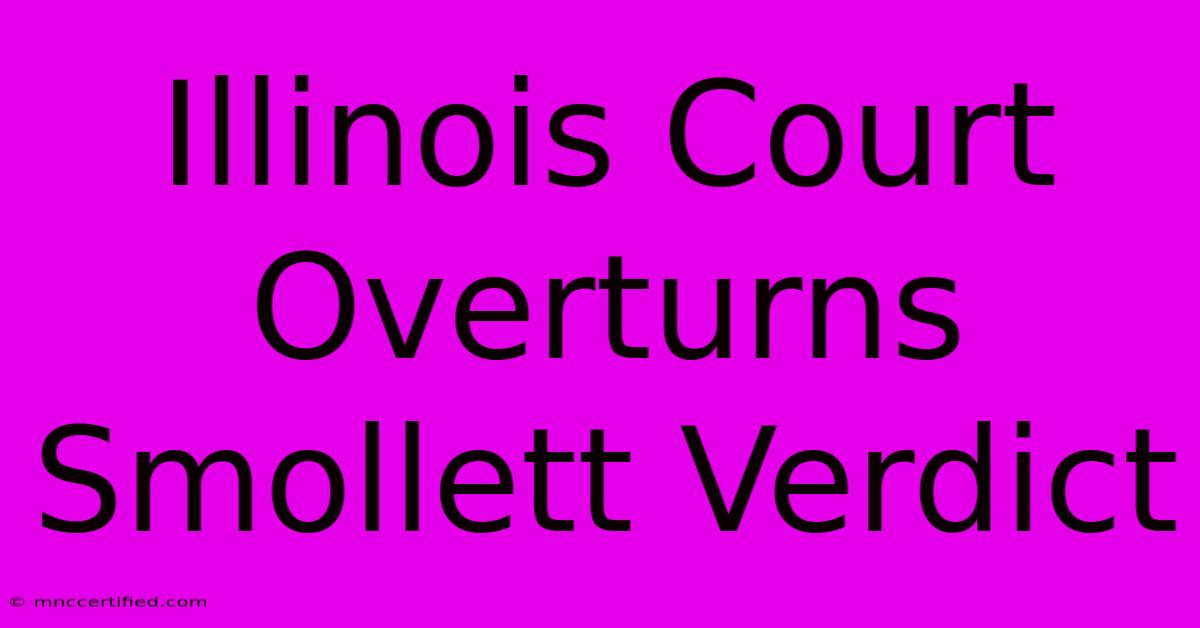Illinois Court Overturns Smollett Verdict

Table of Contents
Illinois Court Overturns Smollett Jussie Smollett Verdict: A Legal Earthquake
The Illinois Appellate Court's decision to overturn Jussie Smollett's conviction on charges of staging a hate crime has sent shockwaves through the legal and media worlds. This landmark ruling raises crucial questions about prosecutorial overreach, due process, and the very nature of justice. This article delves into the key aspects of the case, the court's reasoning, and the potential implications moving forward.
Understanding the Original Case: Smollett's False Accusation
In 2019, actor Jussie Smollett claimed he was the victim of a racist and homophobic attack in Chicago. He alleged that two men assaulted him, yelling racial and homophobic slurs, and placed a noose around his neck. The ensuing investigation, however, revealed that Smollett had orchestrated the entire event, paying two brothers to stage the attack. This revelation led to his arrest and subsequent conviction on six counts of disorderly conduct.
The Charges and the Initial Conviction
Smollett was initially charged with filing a false police report, a serious offense carrying significant penalties. The prosecution presented evidence including video footage, text messages, and testimony from the brothers who participated in the hoax. The jury found Smollett guilty, and he faced potential prison time and a substantial fine.
The Appellate Court's Decision: A Reversal of Fortune
The Illinois Appellate Court, in a stunning reversal, overturned Smollett's conviction. The court's decision hinged on a crucial procedural point: the dismissal of a special prosecutor appointed to oversee the case. The court argued that the judge's decision to dismiss the special prosecutor violated Smollett's Sixth Amendment right to a fair trial. This technicality, although seemingly minor, proved decisive in the court's ruling.
The Significance of the Special Prosecutor's Dismissal
The court's focus on the dismissal of the special prosecutor underscores the importance of procedural fairness in the legal system. The ruling highlights the potential ramifications of irregularities in the prosecutorial process, regardless of the defendant's guilt or innocence. Critics argue this sets a dangerous precedent, potentially undermining the integrity of future prosecutions.
The Fallout and Future Implications: A Legal and Public Debate
The appellate court's decision has ignited a firestorm of debate. Supporters of the ruling emphasize the importance of upholding strict adherence to legal procedure. They argue that even if Smollett was undeniably guilty, procedural errors cannot be overlooked. Conversely, critics express outrage, viewing the decision as a miscarriage of justice that diminishes the seriousness of Smollett's actions and the impact on public trust.
Public Perception and the Media's Role
The Smollett case has been a highly publicized event, with media coverage shaping public opinion significantly. The appellate court's decision will undoubtedly further fuel the ongoing debate, with discussions focusing on the media's role in influencing public perception of the legal proceedings and the justice system itself.
Potential for Further Appeals: The Case's Uncertain Future
The possibility of further appeals remains open. The prosecution could appeal the appellate court's decision to the Illinois Supreme Court, potentially leading to a protracted legal battle. The final outcome of the Smollett case remains uncertain, leaving the question of justice hanging in the balance.
Conclusion: Questions of Due Process and Public Trust
The Illinois Appellate Court's decision to overturn Jussie Smollett's conviction highlights the complexities of the legal system and the delicate balance between procedural fairness and achieving justice. The case raises profound questions about prosecutorial ethics, due process, and the impact of such rulings on public trust in the courts. The ongoing debate surrounding this controversial case will undoubtedly continue to shape discussions on the intersection of law, media, and public perception for years to come. The ultimate outcome remains to be seen, but its influence on future legal proceedings is undeniable.

Thank you for visiting our website wich cover about Illinois Court Overturns Smollett Verdict. We hope the information provided has been useful to you. Feel free to contact us if you have any questions or need further assistance. See you next time and dont miss to bookmark.
Featured Posts
-
Most Lucrative Insurance To Sell
Nov 22, 2024
-
Unison Pays Tribute To Prescott
Nov 22, 2024
-
Princeton Swimmers Vs Penn Cornell
Nov 22, 2024
-
Dealing With Fred Loya Insurance
Nov 22, 2024
-
De Generes De Rossi Leaving Us
Nov 22, 2024